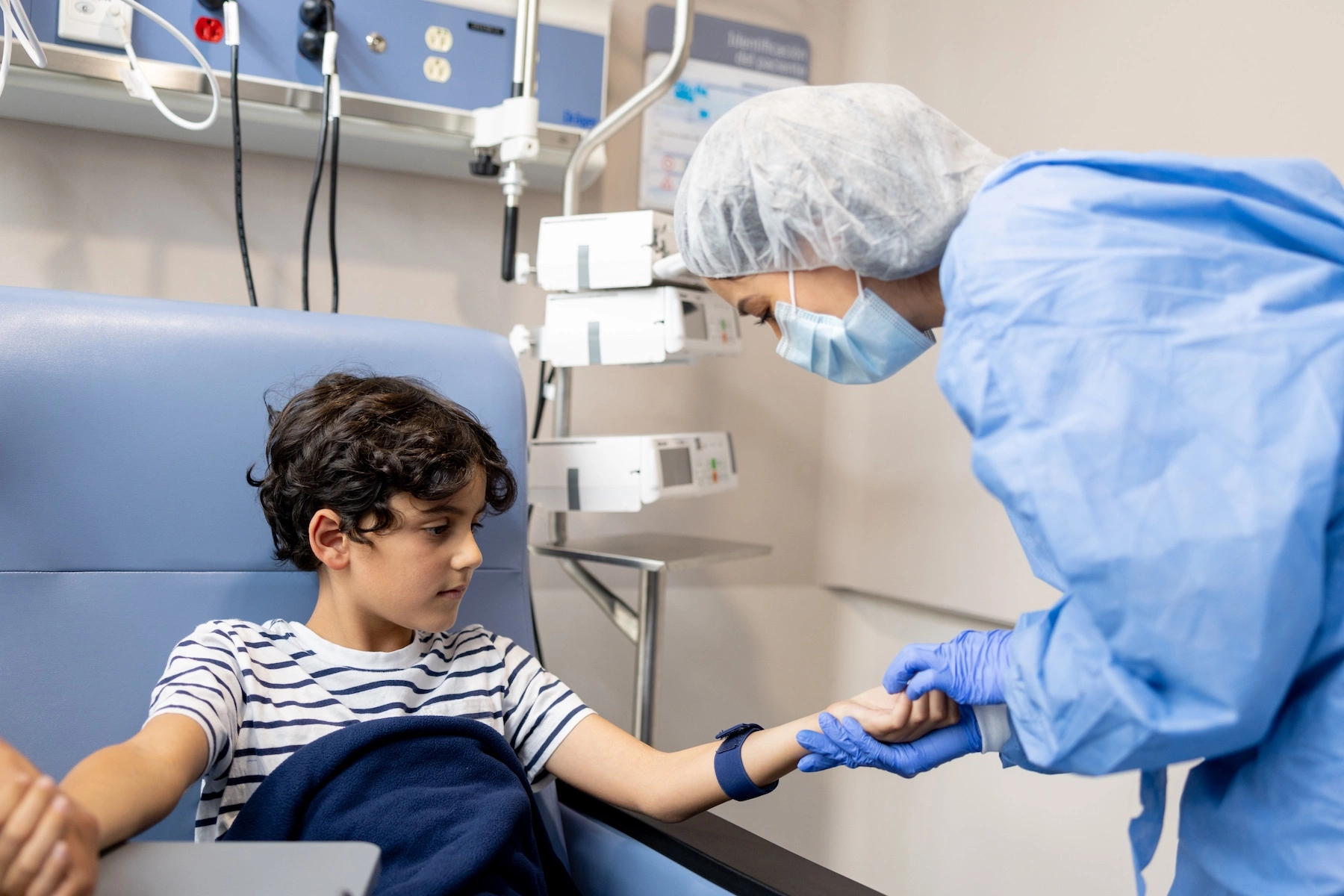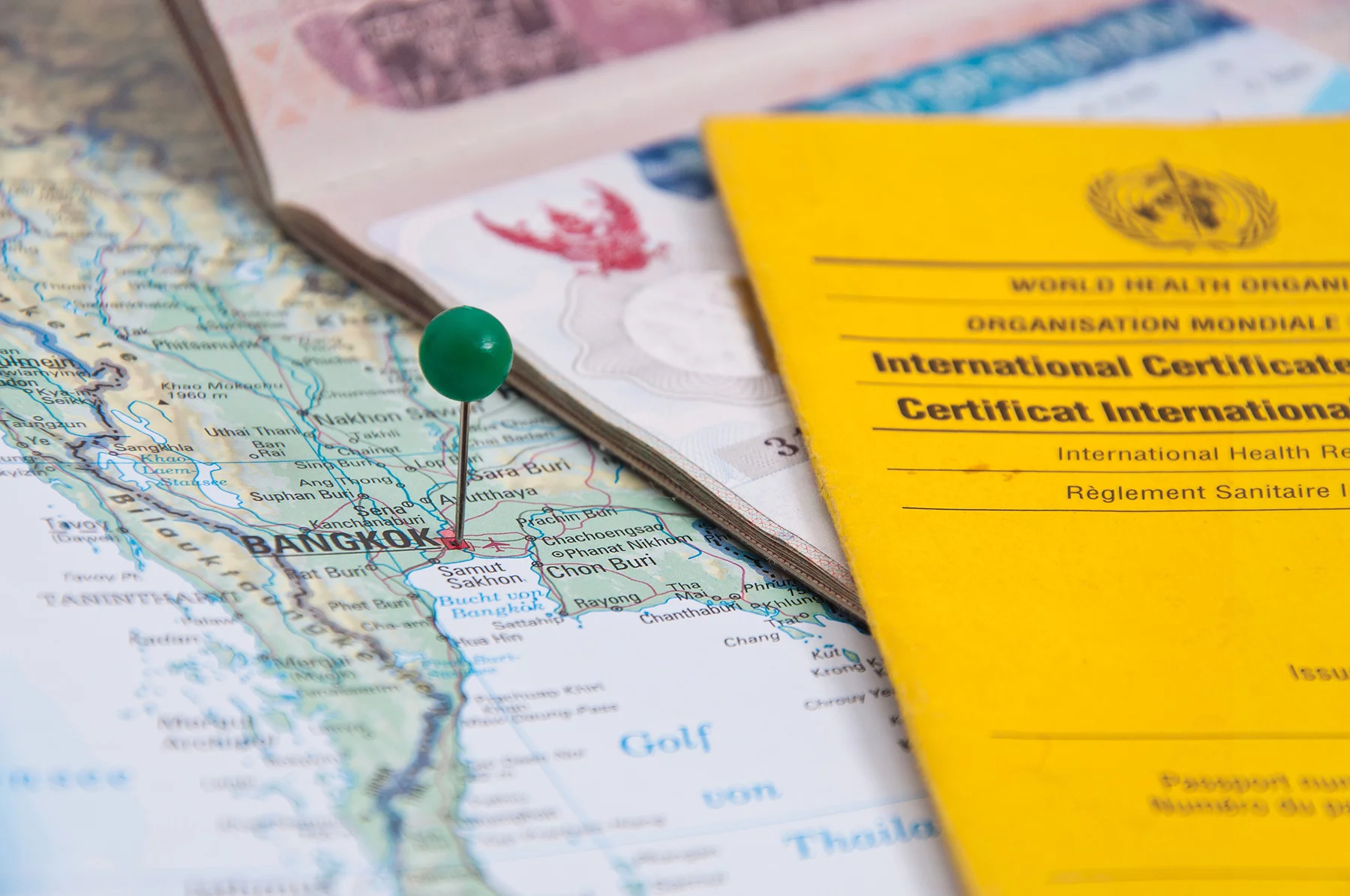The Belgian healthcare system provides free vaccinations in Belgium, although the system for getting these vaccinations can be somewhat confusing if you are unfamiliar with Belgium’s complex government. This guide will provide essential information to help you navigate the system, such as which vaccines are mandatory and where to get them.
Business & Expats Health Insurance
Looking for expat-friendly health insurance in Belgium? Business & Expats Health insurance provides a dedicated service for families, individuals, and businesses moving to Belgium. With competitive benefits, expert advice, and fast reimbursements on all treatments, choose Business & Expats today.
The Belgian vaccination system
Prior to 2015, the national government organized the vaccination policy in Belgium. As a result of the Sixth State Reform, the responsibility for vaccinations (as well as many other things relating to family health) was shifted to the three language communities of Belgium.

The authorities managing and overseeing vaccinations in the three communities are the following:
- Flemish Community: Kind en Gezin
- French Community: Office de la Naissance et de l’Enfance
- German-speaking Community: Kaleido
Only one vaccination is legally required in Belgium: polio. The polio vaccine has been required for all residents in Belgium since 1967.
Insurance for vaccinations in Belgium
Most vaccinations in Belgium are covered by Belgium’s state-run health insurance program. Exceptions to this include the rotavirus vaccine as well as many travel-related inoculations.
Coverage of vaccinations may vary by the insurance fund (Dutch: ziekenfonds, French: mutuelle) that you register with, however. There are a number of different mutuelles in Belgium, such as:
- Business & Expats Health Insurance
- Mutuelle Chrétienne
- Mutualité Socialiste
- Symbio
Conversely, private health insurance companies in Belgium may offer more comprehensive coverage for vaccinations. There are quite a few private health insurance companies operating in Belgium, such as:
Vaccinations for children in Belgium
If your child is born in Belgium, your doctor will assist you when it comes to scheduling appointments for vaccines, whether they are required or just recommended. Many of the vaccinations are free in Belgium, regardless of where you live or which of Belgium’s linguistic communities represents you.

Mandatory and recommended vaccinations
Only one vaccination is mandatory throughout Belgium: polio. Unless there is a valid medical reason for a child not to receive the vaccine, all children in Belgium must be vaccinated for polio by 18 months of age. After receiving the last dose of the polio vaccine, the doctor will complete a certificate that confirms the child has been vaccinated against polio; your local municipality requires this certificate straightaway.
Parents who refuse to vaccinate their children for polio, however, could face fines or even a prison sentence; in fact, children cannot attend daycare or school if they are not vaccinated for polio.
Rules for vaccinations in Belgium are handled by the country’s three linguistic communities, specifically: one for Francophones, one for Dutch speakers, and one for German speakers. These three communities have jurisdiction over certain areas of the country; though if you live in Brussels, you are able to select which community you receive vaccinations from.
French Community
In the French Community (i.e., the Brussels Capital Region and Wallonia), children need seven different immunizations before they can go to a daycare or a school:
- diphtheria
- measles
- mumps
- rubella
- type b haemophilus influenzae
- whooping cough
Infants can also receive an oral vaccine that protects against rotavirus, though parents will need to pay a fee for it.
Vaccines in the French Community are administered by the Office de la Naissance et de l’Enfance (ONE).
Flemish Community
In the Flemish Community (i.e., the Brussels Capital Region and Flanders), other vaccinations are not compulsory, just strongly recommended.
Infants receive a number of vaccines, such as:
- a six-in-one vaccine for diphtheria, hepatitis B, polio, tetanus, whooping cough, and type b haemophilus influenzae;
- a vaccine that protects against ten different varieties of pneumococcus;
- a vaccine for protection against measles, mumps, and rubella.
Similarly to the French Community, the rotavirus vaccine is not free of charge.
Vaccinations for the Flemish Community are handled by Kind en Gezin.
German Community
In the German Community (i.e., nine municipalities located in the eastern part of Liège), there are no additional vaccinations that are compulsory. However, the German Community recommends the following vaccines:
- a six-in-one vaccine for diphtheria, hepatitis B, polio, tetanus, whooping cough, and type b haemophilus influenzae;
- a vaccine that protects against ten different varieties of pneumococcus;
- a vaccine for protection against measles, mumps, and rubella.
Vaccinations in the German Community are administered by Kaleido.
Vaccination schedule in Belgium
Schedules for vaccinations in Belgium are generally equivalent to one another across the three communities, but there are slight variations depending on which community serves you.
Vaccination schedule for the Flemish Community
According to the vaccination schedule for the Flemish Community, children are able to receive vaccinations protecting against at least ten different diseases.
One combined vaccine protects against six different diseases (diphtheria, hepatitis B, polio, tetanus, whooping cough, type b haemophilus influenza, and hepatitis B) and is administered to babies on four occasions at the following ages: eight weeks, 12 weeks, 16 weeks, and 15 months. Another protects against ten different varieties of pneumococcus and requires three doses (eight weeks, 16 weeks, and one year). Children also receive a single-dose vaccine for measles, mumps, and rubella at one year of age.
As in the French Community, the rotavirus vaccine is not free of charge, however. This vaccine is administered at eight weeks, 12 weeks, as well as 16 weeks of age.
Vaccination schedule for the French Community
Babies in the French Community are immunized five times according to the vaccination calendar (in French only, however). Inoculations occur at the following ages: eight weeks, 12 weeks, 16 weeks, 12 months, and 15 months. Most vaccines are free for babies, infants, and adolescents, although the oral rotavirus vaccine is not.
Children receive vaccines at the following times:
- eight weeks: diphtheria, hepatitis B, polio, tetanus, type b haemophilus influenzae, whooping cough; pneumococcus; rotavirus.
- 12 weeks: diphtheria, hepatitis B, polio, tetanus, type b haemophilus influenzae, whooping cough; rotavirus.
- 16 weeks: diphtheria, hepatitis B, polio, tetanus, type b haemophilus influenzae, whooping cough; pneumococcus; rotavirus.
- 12 months: measles, mumps, rubella; pneumococcus.
- 15 months: diphtheria, hepatitis B, polio, tetanus, type b haemophilus influenzae, whooping cough; meningitis C.
- 5–6 years: diphtheria, polio, tetanus, whooping cough.
- 11–12 years: measles, mumps, rubella.
- 13–14 years: human papillomavirus.
- 15–16 years: diphtheria, tetanus, whooping cough.
Vaccination schedule for the German Community
As a result of its location within the primarily French-speaking region of Belgium, the vaccination schedule (in German) for the German Community is broadly similar to that of the French Community. Children living in the German Community will receive vaccinations at the following ages:
- eight weeks: diphtheria, hepatitis B, polio, tetanus, type b haemophilus influenzae, whooping cough; pneumococcus; rotavirus.
- 12 weeks: diphtheria, hepatitis B, polio, tetanus, type b haemophilus influenzae, whooping cough; rotavirus.
- 16 weeks: diphtheria, hepatitis B, polio, tetanus, type b haemophilus influenzae, whooping cough; pneumococcus; rotavirus.
- 12 months: measles, mumps, rubella; pneumococcus.
- 13–18 months: diphtheria, hepatitis B, polio, tetanus, type b haemophilus influenzae, whooping cough; meningitis C.
- 6–7 years: diphtheria, polio, tetanus, whooping cough; measles, mumps, rubella.
- 10–12 years: measles, mumps, rubella.
- 13–14 years: human papillomavirus.
- 14–16 years: diphtheria, tetanus, whooping cough.
Vaccinations for special groups in Belgium
Seasonal flu vaccines are available for the elderly, though they may not be free in the community that you live in.
In the Flemish Community, flu vaccines are only free of charge if you reside in a healthcare facility of some kind, though. Partial reimbursement is available, however, to those over the age of 65 with a prescription. Meanwhile, the French Community partially covers flu shots for those with a higher risk of complications (e.g., elderly individuals).
Pregnant women in Belgium also receive a pertussis vaccination between 24 and 32 weeks of gestation.
Travel vaccinations in Belgium
Vaccination requirements for entering Belgium may exist depending on your nationality; check with a Belgian embassy or consulate in your area before you travel to Belgium to make sure.
Clinics in Belgium provide vaccinations for infectious diseases for those planning to travel to high-risk areas, such as:
- Cholera
- Dengue
- Japanese encephalitis
- Malaria
- Meningitis
- Rabies
- Schistosomiasis
- Tick encephalitis
- Typhoid
- Yellow fever

The Institute of Tropical Medicine in Antwerp provides comprehensive information in English regarding infectious diseases as well as how to protect yourself against them. The Institute also operates a clinic for prospective travelers.
In addition, many hospitals and polyclinics in Belgium operate in-house travel clinics. Check with your local healthcare facility to be sure.
Useful resources
Need even more information about vaccinations in Belgium? Refer to the following resources for in-depth details about vaccinations, the schedules, and how to organize appointments:
- Laat je vaccineren is a Dutch-language resource for vaccines in the Flemish Community of Belgium
- Vaccination Info is a French-language resource for vaccines in the French Community of Belgium




